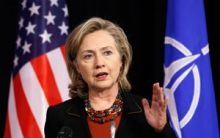Before the NATO summit in Lisbon (November 19-20), print media lashed out at the Alliance, with some experts accusing NATO of lack of strategy and clear vision. Is this criticism grounded? What can Ukraine expect from this summit? More on this in the following interview with Dr. Hryhorii PEREPELYTSIA, Ph.D., Lecturer in Philosophy, Taras Shevchenko National University, Kyiv.
“To begin with, NATO’s strategic concept is drafted by a team of experts. Second, the priorities here are quite innovative, pointing to NATO shifting the emphasis from Europe, in response to international threats to the Alliance’s security. Among NATO’s highest priorities is stabilizing the situation in Afghanistan and supporting this country’s democratic process. Russia is another priority. For the first time NATO’s new strategic concept pays this much attention to Russia.”
Would you care to comment on the reasons?
“The fact that Russia is among NATO’s top priorities is explained by Georgia’s fiasco in the recent war against Russia. In fact, Russia’s experts believe that, back in 2008, Russia was fighting the West, rather than Georgia, and that winning that war was Russia’s first [recent] geopolitical victory over the West — above all, over the United States and its NATO allies; that this victory had actually elbowed the US interests out of post-Soviet territory, confirming that it is de facto within Russia’s sphere of influence. Right now Russia is returning to the imperial political model, so it is only natural to expect it to have a policy aimed at dominating in what it considers to be its realm.
“NATO is aware of all this, of course, even if they prefer to keep silent on the subject. Proceeding from this key concept, Russia is presented as NATO’s most important partner in the new strategic concept. NATO is counting on Russia’s support in meeting new global challenges.”
In other words, NATO may consent to Moscow’s control over Ukraine in return for the Kremlin’s support?
“Officially NATO will never recognize Ukraine as part of Russia’s sphere of influence; their principled stand remains that NATO’s relations with Russia and Ukraine are to be treated as absolutely different notions, thus indicating that Ukraine is an independent member of the international community of nations.
“It is also true that Ukraine’s current official policy is totally different, compared to that of the previous government. Ukraine has made it clear that it denies NATO membership prospects and actually rejected the obligations undertaken at the Bucharest summit. Kyiv has turned away from NATO to face the Kremlin. Even worse, no official moves in NATO’s direction are allowed, lest they irk Russia. This is a regular political satellite’s policy.
“Instead, we hear about constructive Ukraine-NATO partnership. International experience shows this to be the beginning of effective cooperation, as long as confrontation is avoided. But it is also true that constructive cooperation is much less than personal partnership.”
A Ukrainian diplomat told me that Ukraine would be admitted to NATO once it said it was ready.
“This diplomat was right about Ukraine being ready. No preparations are being made and the [Ukraine-NATO] integration issue has been deleted from the agenda. All we can discuss at present is cooperation on the technical or operating level, never on the political one. Considering Ukraine’s participation in [peacekeeping] operations in Afghanistan or other UN-led missions, the logical question is: ‘Why should we do this, given that not all NATO countries are sending their troops to Afghanistan?’”
Could the current government be biding their time and then receive NATO membership, without much ado?
“Not likely, with our government saying that Ukraine is a non-bloc country. The next logical question is about the military reform. Is it aimed at the non-bloc or collective defense status? Collective defense has been deleted from both the political and tactical agendas. Then why should the Armed Forces of Ukraine take heed of this in the military reform? There are many questions that remain unanswered following the dramatic change in Ukraine’s domestic and foreign political course. At one time, Ukraine had the opportunity of joining NATO, but then rejected it, yet NATO holds its door open.”
A number of retired German generals and ministers are saying that Russia’s NATO membership would be a welcome possibility. What do you think?
“Indeed, such views are widespread in the West. By the way, a team of Russian experts worked at the NATO headquarters to prepare and submit to Medvedev draft proposals, to the effect that Russia is actually seeking NATO membership. Such Russian membership ideas are getting increasingly popular in that country’s liberal and political circles, but this is an illusion, at least for as long as Russia keeps building its state using the authoritarian imperial model. This will hold once Russia switches back to democracy. As it is, Russia lacks the preconditions of discarding its authoritarian regime — known as controlled democracy — and adopting a truly democratic one.”
What about the fact that some experts say that various NATO countries’ views on the threats facing this alliance can lead to NATO’s collapse?
“These experts have a point. I wouldn’t say that NATO will fall apart, because there is that subconscious interest in security. The NATO umbrella effect is still strong amongst leaders of Western countries, even if only on the subconscious level. They can all criticize NATO, but none of them, not even Germany, wants to lose this umbrella. Much is being said about the European security system, yet few if any believe it is really effective. With NATO alive and kicking, no one wants to take any radical steps against the alliance, simply because there appears to be no alternative in terms of collective security. It is also true that the relationships between NATO member countries are markedly on a downward curve, above all because of the [disagreements on] the concept of threats.”








